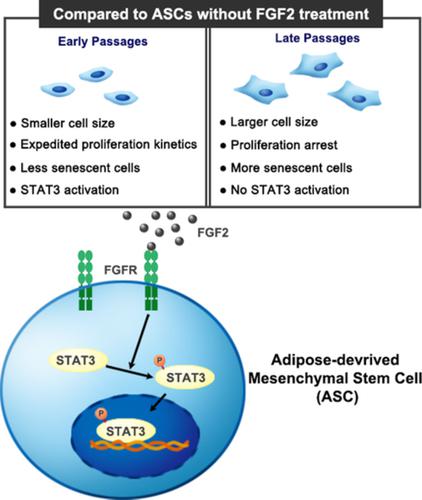当前位置:
X-MOL 学术
›
Stem Cells Transl. Med.
›
论文详情
Our official English website, www.x-mol.net, welcomes your feedback! (Note: you will need to create a separate account there.)
The influence of fibroblast growth factor 2 on the senescence of human adipose-derived mesenchymal stem cells during long-term culture.
STEM CELLS Translational Medicine ( IF 6 ) Pub Date : 2019-12-16 , DOI: 10.1002/sctm.19-0234 Yin Cheng,Kai-Hsuan Lin,Tai-Horng Young,Nai-Chen Cheng
STEM CELLS Translational Medicine ( IF 6 ) Pub Date : 2019-12-16 , DOI: 10.1002/sctm.19-0234 Yin Cheng,Kai-Hsuan Lin,Tai-Horng Young,Nai-Chen Cheng

|
Adipose‐derived mesenchymal stem cells (ASCs) exhibit great potential in regenerative medicine, and in vitro expansion is frequently necessary to obtain a sufficient number of ASCs for clinical use. Fibroblast growth factor 2 (FGF2) is a common supplement in the ASC culture medium to enhance cell proliferation. To achieve clinical applicability of ASC‐based products, prolonged culture of ASCs is sometimes required to obtain sufficient quantity of ASCs. However, the effect of FGF2 on ASCs during prolonged culture has not been previously determined. In this study, ASCs were subjected to prolonged in vitro culture with or without FGF2. FGF2 maintained the small cell morphology and expedited proliferation kinetics in early ASC passages. After prolonged in vitro expansion, FGF2‐treated ASCs exhibited increased cell size, arrested cell proliferation, and increased cellular senescence relative to the control ASCs. We observed an upregulation of FGFR1c and enhanced expression of downstream STAT3 in the initial passages of FGF2‐treated ASCs. The application of an FGFR1 or STAT3 inhibitor effectively blocked the enhanced proliferation of ASCs induced by FGF2 treatment. FGFR1c upregulation and enhanced STAT3 expression were lost in the later passages of FGF2‐treated ASCs, suggesting that the continuous stimulation of FGF2 becomes ineffective because of the refractory downstream FGFR1 and the STAT3 signaling pathway. In addition, no evidence of tumorigenicity was noted in vitro and in vivo after prolonged expansion of FGF2‐cultured ASCs. Our data indicate that ASCs have evolved a STAT3‐dependent response to continuous FGF2 stimulation which promotes the initial expansion but limits their long‐term proliferation.
中文翻译:

在长期培养过程中,成纤维细胞生长因子2对人脂肪来源的间充质干细胞衰老的影响。
脂肪间充质干细胞(ASC)在再生医学中显示出巨大的潜力,通常需要体外扩增以获得足够数量的ASC用于临床。成纤维细胞生长因子2(FGF2)是ASC培养基中常见的补充剂,可增强细胞增殖。为了实现基于ASC的产品的临床适用性,有时需要长时间培养ASC才能获得足够数量的ASC。但是,FGF2在长时间培养过程中对ASC的作用尚未确定。在这项研究中,在有或没有FGF2的情况下,ASCs都要经过长时间的体外培养。在早期ASC传代中,FGF2保持了小细胞形态并加快了增殖动力学。经过长时间的体外扩增,经过FGF2处理的ASC的细胞大小增加,细胞增殖停滞,相对于对照ASC,细胞衰老增加。我们观察到上调在FGF2处理的ASC的初始传代过程中,FGFR1c和下游STAT3的表达增强。FGFR1或STAT3抑制剂的应用有效地阻止了FGF2处理诱导的ASC增殖增强。FGFR1c的上调和STAT3表达的增强在经过FGF2处理的ASC的后代中消失了,这表明由于下游难治的FGFR1和STAT3信号通路,对FGF2的连续刺激变得无效。此外,在FGF2培养的ASCs长时间扩展后,在体外和体内均未发现致瘤性证据。我们的数据表明,ASC已对连续FGF2刺激产生了STAT3依赖性反应,从而促进了初始扩增,但限制了其长期增殖。
更新日期:2019-12-16
中文翻译:

在长期培养过程中,成纤维细胞生长因子2对人脂肪来源的间充质干细胞衰老的影响。
脂肪间充质干细胞(ASC)在再生医学中显示出巨大的潜力,通常需要体外扩增以获得足够数量的ASC用于临床。成纤维细胞生长因子2(FGF2)是ASC培养基中常见的补充剂,可增强细胞增殖。为了实现基于ASC的产品的临床适用性,有时需要长时间培养ASC才能获得足够数量的ASC。但是,FGF2在长时间培养过程中对ASC的作用尚未确定。在这项研究中,在有或没有FGF2的情况下,ASCs都要经过长时间的体外培养。在早期ASC传代中,FGF2保持了小细胞形态并加快了增殖动力学。经过长时间的体外扩增,经过FGF2处理的ASC的细胞大小增加,细胞增殖停滞,相对于对照ASC,细胞衰老增加。我们观察到上调在FGF2处理的ASC的初始传代过程中,FGFR1c和下游STAT3的表达增强。FGFR1或STAT3抑制剂的应用有效地阻止了FGF2处理诱导的ASC增殖增强。FGFR1c的上调和STAT3表达的增强在经过FGF2处理的ASC的后代中消失了,这表明由于下游难治的FGFR1和STAT3信号通路,对FGF2的连续刺激变得无效。此外,在FGF2培养的ASCs长时间扩展后,在体外和体内均未发现致瘤性证据。我们的数据表明,ASC已对连续FGF2刺激产生了STAT3依赖性反应,从而促进了初始扩增,但限制了其长期增殖。


























 京公网安备 11010802027423号
京公网安备 11010802027423号